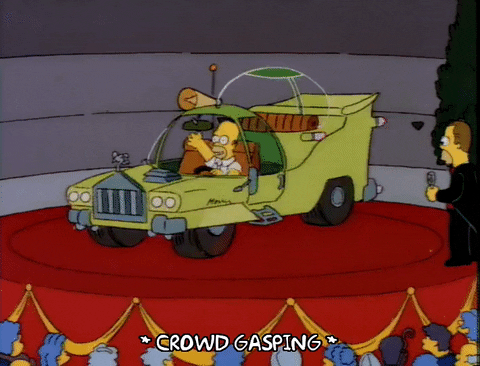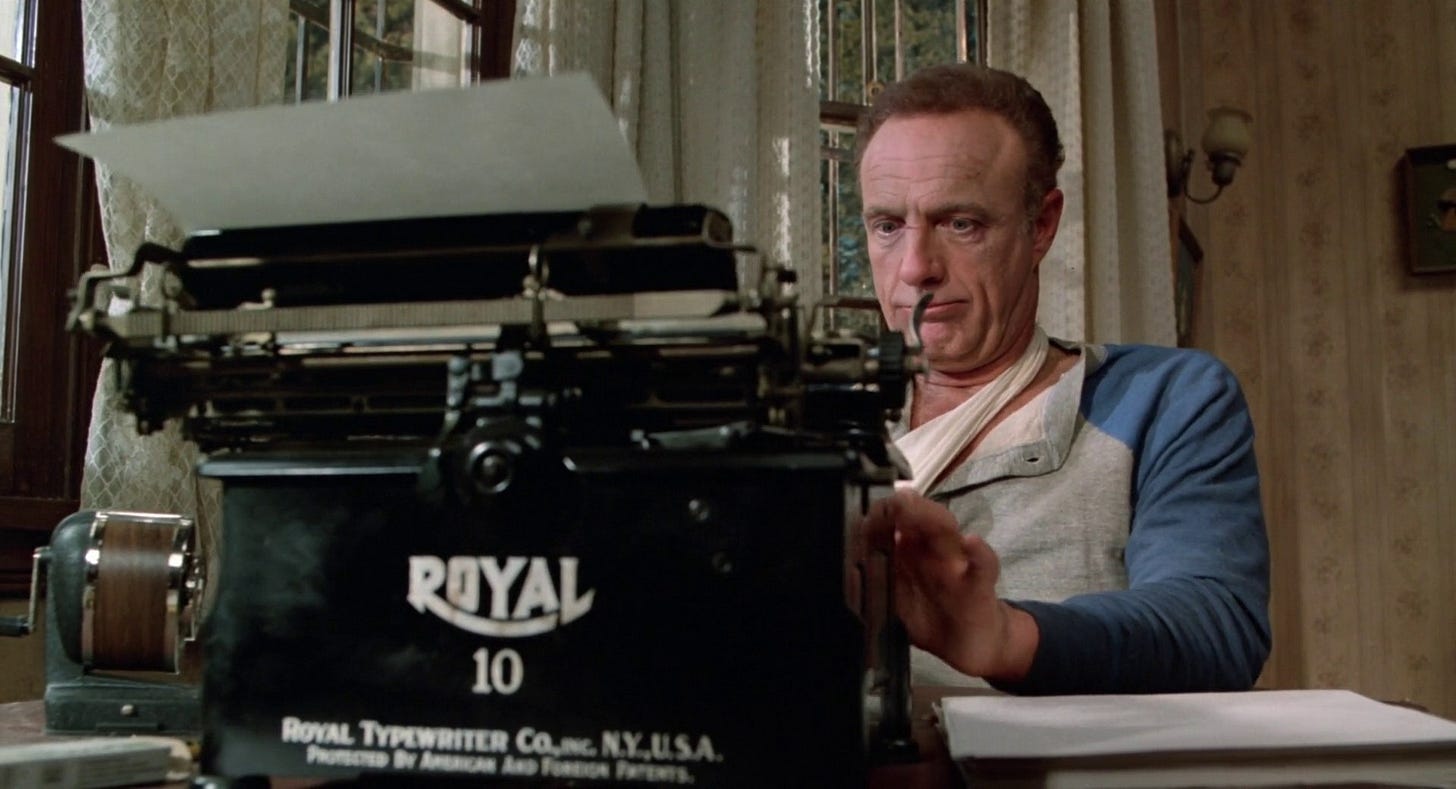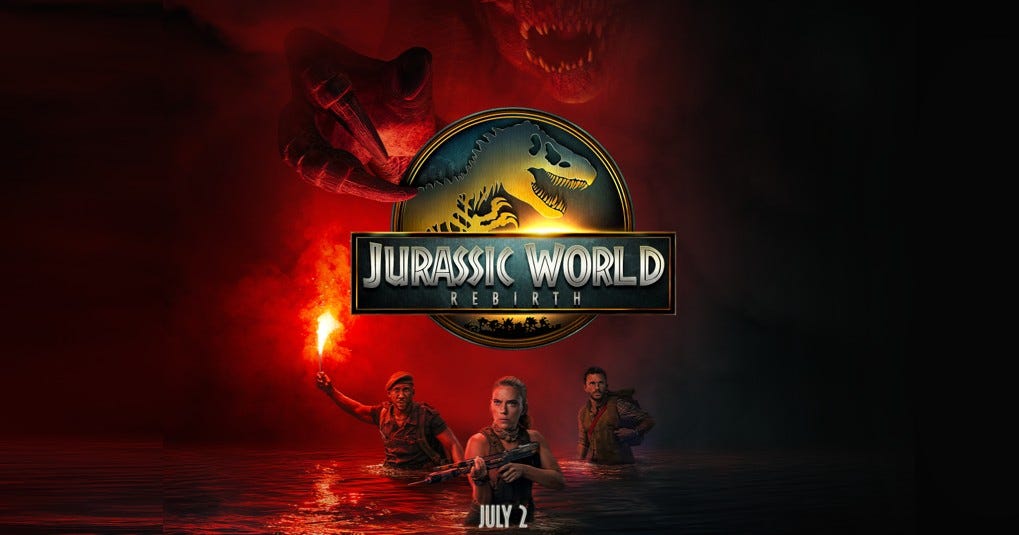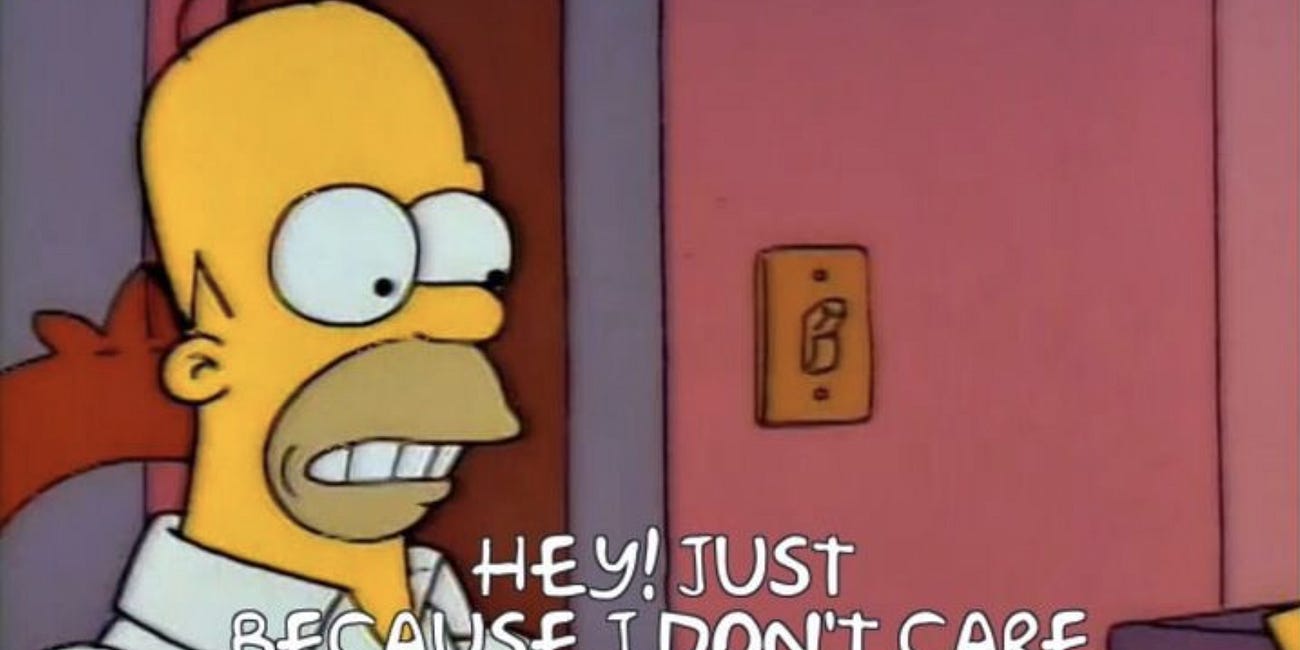Do I Make Art for Me or You?
Existential questions of artist integrity and how an audience can get in the way
J.D. Salinger, author of The Catcher in the Rye, which I recently read for the first time and loved, once said “an artist’s only concern is to shoot for some kind of perfection, and on his own terms, not anyone else’s.”
Interestingly, Vladimir Nabokov, author of the challenging but beautifully written Lolita, said “a work of art has no importance whatever to society. It is only important to the individual.”
I find these similar but varying notions fascinating. One believes that the artist should only create for themselves without regard for anybody else. The other believes that they aim to connect to another, singular, through their work. It’s comforting that neither wish to appease everybody, which is impossible, but rather communicate directly with the person enjoying it or simply themselves. This got me thinking about who I create for, when, and why.
I recently went to a show with a friend who also writes and makes music and we had a discussion about this nuanced motive over dinner. It began with the question do you make art for yourself or others? We both agreed that we do it for ourselves. It’s a compulsion, less a hobby than a way of life, this creative expression. But we also agreed that it depends on a number of things. It’s not like we both release music because we don’t want anybody to hear it.
This only led to more questions. Would you still create if you knew that it wouldn’t be shared? Would you be disappointed if your art died with you, buried in a hard drive or in the corner of your closet? Would you keep making it if nobody else liked it, hated it even? These are all things that we hadn’t really considered before and made us realise just how much of our artist integrity we might have otherwise been willing to sacrifice without knowing it.
It’s a good thought experiment and an excellent way to reflect on your motives and influences as an artist. It also helps to stay modest and make sure that your head doesn’t get too big when people compliment your work. But it also comes with its fair share of self-sabotage and imposter syndrome. I’ve gone weeks without creating in the past because I didn’t think anything that I made was good enough, or somebody had criticised my work online – even if it was justified.
If you’re reading this, there’s a good chance that you’re an artist too, or at least creative. I’m sure you can understand that we all need validation to know we’re doing something right. Whether it’s from our parents, our friends, our colleagues, our peers or complete strangers, sometimes a little recognition and feedback is enough to keep us going. Even negative criticism is still a reaction, which is infinitely better than indifference, and can fuel the fire of creativity. As they say, any publicity is good publicity.
Can you imagine if artists like N.W.A and Rage Against the Machine gave up at the first sign of adversity? The hip hop and rock scenes would be very different now, that’s for sure.
Do you make art for yourself or others?
I like to think that I create for myself, first and foremostly, as a means of expression. To process my complicated feelings and turn them into something meaningful. Creating a work of art using only your imagination and whatever you have available is magical. It’s also a lot of fun. Finding new ways to fit rhymes together or describe the joys and pains of existence excites me. Writing and singing and producing and podcasting makes me happy, and sometimes that’s all there is to it.
But I also like to share my thoughts here in the form of essays and poetry, in case it might resonate with others or help them too. Perhaps I see a movie that I like and desperately want to talk about, but nobody I know has seen it or is even interested. Maybe I have a problem and would like to seek the advice from somebody in a certain industry or beyond my circle. Besides, there’s nothing quite like watching people sing songs back to you from the stage that you wrote in your bedroom years ago.
Would you still create if you knew that it wouldn’t be shared?
Absolutely! I’ve filled notebooks with lyrics, poetry and story ideas that may never see the light of day. I’ve got beats from five years ago sitting on my computer that I still come back to regularly. I even made some short films when I was a teen that only my friends and family have had the displeasure of seeing. Because even if you never publish it anywhere, you get better the more that you do it. A lot of hard work goes on behind the scenes before you get what you see.
I mentioned in a previous post that I made a concept album after a breakup and never released it. Mainly due to the audio quality and lyrical content, but also because the creative process was purely cathartic. It was the most suitable outlet for my emotions at the time when simply writing them down or talking them out wasn’t enough. I’m also currently compiling a collection of poetry to self-publish because my nan has been telling me to do something with it for years, which may have never crossed my mind otherwise.
Would you be disappointed if your art died with you?
Yes and no. If I’m halfway through a project when I go, please don’t share it with the world – I’d be mortified to be remembered by a work in progress. Unless my friend and producer Tony has the stems to a song we’re working on, or I have a file on my hard drive titled Manuscript FINAL (V6), this is it. Maybe that’s the perfectionist in me, but I’m coming around to the idea that art is never truly finished, only abandoned.
I’m always a little sceptical of posthumous art. Not because of its publication without the artist’s knowledge or intent, but of its potential to be taken out of context and misconstrued. Some of the shit that I write is incoherent and quite dark before it gets refined, so to have it scrutinised by anybody else before its ready for the world would be doing a disservice to my creative process. Then again, why do I feel such a self-importance for my work if nobody’s heard of it?
Would you keep making it if nobody else liked it?
This is a tricky one. As I’ve explained, I generally create for myself with an audience in mind, but not necessarily for them. When I co-hosted a podcast called Dead House with my friend Nathan, we made the decision to stop after 100 episodes – for us. Our success kind of plateaued around episode 50; the active listeners, the number of downloads, the level of engagement on social media. But we kept going because we were still having fun catching up every week to talk about scary movies.
However, creating with an audience can inhibit the process and diminish authenticity. It comes with an external pressure to meet expectations and may even censor or dilute the message. But the personal is the universal. There’s guaranteed to be somebody, somewhere, who thinks and feels the same way that you do. This is why raw, evocative music and brutally honest writing resonates deeply with others. It forms a strong emotional connection with another human being.
This also becomes problematic when major film studios churn out endless sequels and reboots with recycled IP and legacy characters for soulless cash grabs. The trouble is that the trend won’t change anytime soon because people keep showing up to watch them and buy merch. Many viewers are beginning to lose faith in the industry because the executives aren’t paying attention to what they’re saying, only what they’re doing – and, sadly, numbers speak louder than words.
I love the idea that once you release your art into the world, it’s no longer yours. It’s anybody’s to interpret and make their own, whether they cherish or criticise it. This sense of ownership is a peculiar concept, but one that I’m guilty of myself. The art that I respect most is that which challenges authority or convention to disrupt society and effect change. As Nabokov said, it is only important to the individual. So perhaps we create it to give it to those who don’t have an outlet for their emotions and build a sense of community.
Whether a work of art is purely created by and for the artist depends on the medium, scale, contributors, aim and reception, among other things. For example, many production companies invest in a film and its team to get it made, therefore it must meet certain criteria to be considered a commercial success. Of course, there are exceptions – hence the “cult classic.” But does that make it mean any less to the creators? This is why it gets messy when money becomes a factor in the discussion of art.
Substack follows a similar model, though not exclusively, wherein creators must at least take their audience into account when relying on financial support to generate and share their work. Sure, you could post whatever you like and trust that the right people will find it and stick around. But once you have an audience, there’s an inherent expectation to meet, even if it’s just something as simple as a consistent posting schedule or general subject. While this can motivate an artist, it can also deter them.
This is why famous musicians feel pressured to perform once they’re in the spotlight. They know that it could all disappear at any moment if they make a single misstep, so each creative decision is critical to the success of their career. It’s the same reason that the reception of a contracted artist’s second album is so much more important than the first. Bob Dylan, Metallica and Eminem are all great examples of this. Ironically, it’s when the (grand)father’s of thrash cut their hair and started making rock ballads that I first discovered them as a child.
The stripped opener of Em’s ninth studio album, 2017’s Revival, sums up this unreasonable standard perfectly, with lines like “Take your best rhyme, outdo it, now do it a thousand times.”
On the contrary, there have been many cases of artists nobly refusing to sell their art or accept money for it. Consider how enigmatic street artist Banksy strikes overnight without any price of admission, or how Radiohead became one of the first major acts to surprise drop a free album online with 2007’s In Rainbows. It’s a similar philosophy adopted by friends of mine who are brilliant photographers, but don’t charge for their services because they do it for the fun and fulfilment of it.
Now I understand why the advice that most artists give to other artists is to create what you want to see and hear.
It all comes back to conveying a sense of truth and exclusivity through genuine connection with another person. By speaking from the heart and bleeding into your work, people can feel the passion that it’s imbued with. Maybe that’s partly why The Crow (1994) is one of my favourite movies; Eric reaches Sarah with love the same way that he transfers Shelly’s pain to Top Dollar before defeating him. In which case, I’m very glad that they chose to finish the film in honour of the late Brandon Lee.
So, I’ve come to the conclusion that while I always create for myself, it only makes me happier to learn that you like it too, in whatever way that may be.
I Feel Like a Retail Therapist
As the title suggests, sometimes working in retail can feel like I’m everybody’s therapist. Perhaps I should be flattered, but it’s honestly confusing and exhausting. Customers tell me their problems – without my asking, of course – and I try to offer some sort of comfort in the form of useful products and excellent service. What else can I do when coun…
Advice for My Younger Self
I have a friend at work who loves to ask random philosophical questions to get a good conversation going while we slog through the day. Think things along the lines of “If you could be reincarnated as any animal, what would you be?” We often joke that we need to get high together one day to see just how far we can take these D&Ms, but that they probably…








I don't have time now but have downloaded both parts of your 'Great Debate' podcast. I'm hoping you will increase my internal debate as I've been slowly working on my best list of this century, figuring out13 for each year. I rewatch when I can. As example:
2001 Donnie Darko
2002 28 Days Later ...
2005 The Descent ...
2007 The Orphanage
2008 Eden Lake
2009 Let the Right One In ...
2013 Coherence
2014 It Follows ...
2021 The Innocents
2022 Masking Threshold
2023 Talk to Me
2024 Pandemonium
2025 Bring Her Back, The Rule of Jenny Penn, Dead Mail and Presence in the running.
The biggest problem with lists is that they're Americanised, as if the rest of the world doesn't exist. I hope to change that for 6 or 13 dead people.
We should do it for ourselves whilst not denying that anything made public seeks validation. However, the caveat I've yet to figure out, regarding politics, is how much am I trying to save people versus selfish outrage.